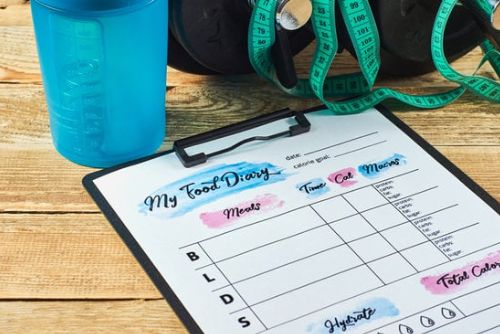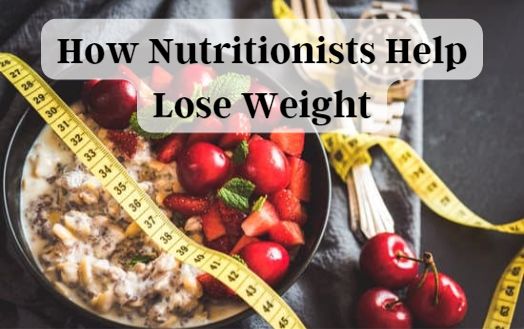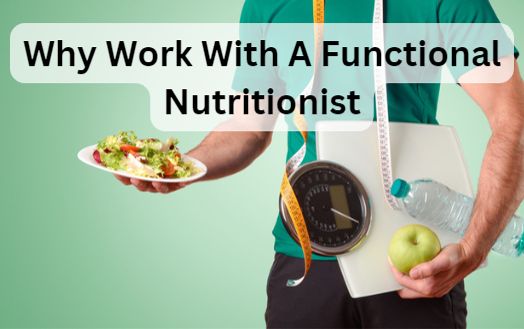Do you ever feel like it’s impossible to keep the weight off? You’re not alone. Millions of people around the world struggle with their weight, and don’t know how to make a lasting change. But there is hope. Nutritionists can help show you how to lose weight for good – and it doesn’t have to be as hard as you think.
This article discusses how nutritionists help lose weight. We’ll also examine nutritionists’ creative methods for helping clients achieve their goals. Finally, we’ll discuss how a professional nutritionist can improve your health.
Read on if you’re struggling to lose weight. With the right plan and a little help from an experienced nutritionist, you can start seeing sustainable results today.
What Is A Dietitian
What is a registered dietitian, and how can they help you lose weight? A registered dietitian (RD) is a university-trained nutritionist. Dietitians educate people about nutrition to improve their health. They offer lifestyle-specific, evidence-based diet advice.
RDs can customize meal plans to meet your nutritional needs and goals using their food and nutrient knowledge. Dietitians can evaluate your diet and suggest ways to eat healthier while still enjoying meals. RDs and clients work together to set realistic goals that will change food and exercise habits for life, helping you lose weight sustainably.
Dietitians don’t just focus on reducing calories; they emphasize the importance of having balanced meals full of essential vitamins and minerals, making sure you get enough fiber, protein, fruits, veggies, whole grains, dairy products, etc., to avoid depriving your body of vital nutrients. This shifts our focus from deprivation diets to nourishment, which empowers us to lose weight.
How To Lose Weight In A Healthy Way
Many struggle to lose weight. Following some simple steps can make it easier. Your weight loss plan should include long-term lifestyle and eating changes. Healthy weight loss tips:
First, eat whole grains, fresh produce, lean proteins, and low-fat dairy. Processed foods are high in sodium, saturated fats, added sugar, and other unhealthy ingredients, so avoid them. Limit soda, juice, and sweets. Instead of three big meals a day, eat smaller portions. This will boost energy without making you overeat.
Second, walk, bike, or swim for 30 minutes every day. Exercise burns calories and improves health and weight loss. Strength training twice a week can build muscle and boost metabolism. Finally, stay hydrated throughout the day to avoid fatigue, hunger, and overeating.
Over time, these small diet and exercise changes will pay off. Don’t give up on losing weight—perseverance pays off.
Benefits Of Working With A Nutritionist

Working with a nutritionist helps achieve weight-loss goals. An expert can help you navigate healthy eating and exercise, which can be complicated. Nutritionists help you lose weight in several ways:
- A Personalized Plan – A nutritionist will create an individualized plan tailored specifically for you that meets your needs as well as taking into account any specific dietary restrictions or allergies. This approach ensures that you get exactly what you need to reach those weight loss goals quickly and safely.
- Accountability – Working alongside someone else makes it easier to stay accountable for following through on healthier lifestyle habits like exercising more frequently and making smarter food choices. Having regular check-ins with a nutritionist provides motivation and encouragement which keeps you focused on reaching your goals faster than going solo.
- Nutrition Education – One of the main reasons people struggle with maintaining their health is because they don’t know how certain foods affect their body and energy levels. Nutritionists provide education about macronutrients, micronutrients, vitamins, minerals, fats, proteins, carbohydrates and other important elements of good nutrition – all while helping people develop better eating habits overall.
- Provides Support – The journey towards achieving a healthy weight is not always easy; there may be bumps along the way caused by unhealthy cravings or just feeling overwhelmed or unmotivated at times. With the help of a qualified professional who understands these challenges, you have access to emotional support plus helpful tips to overcome such obstacles without giving up on yourself.
It’s obvious why so many people turn to nutritionists to lose weight—having an experienced ally gives you the best chance of success. Next, we’ll discuss weight loss meal planning strategies to simplify this process.
Meal Planning Strategies For Weight Loss
Meal planning is essential for weight loss. A nutritionist can help achieve this. Nutritionists help you plan a healthy, customized diet. They can keep you motivated by encouraging you.
Choosing your preferred foods is the first step in meal planning. Your nutritionist can recommend the healthiest foods to help you reach your goals. This includes eating enough protein, healthy fats, fiber, vitamins, minerals, and other nutrients at each meal. They’ll also ensure portion sizes meet caloric intake goals.
After the basics, get creative and start making meals that meet taste and health needs. Find recipes online, or try slow cooking or grilling instead of frying. Your nutritionist can create delicious, weight-loss-friendly meals.
Meal planning isn’t just about choosing healthy food; it’s also about incorporating good eating habits into daily life to sustain weight loss. To maintain weight loss, we must understand how nutrition affects our bodies. Luckily, a nutritionist can provide personalized advice based on scientific research. We can then discuss how exercise helps with weight loss.
Eating Habits And Exercise For Weight Loss

After learning about weight-loss meal planning, focus on diet and exercise. Nutritionists recommend mindful eating and physical activity to lose weight. To make lasting health and lifestyle changes, you must commit to both.
Physical activity options vary by preference. Walking around the neighborhood, taking a yoga class, swimming laps at the pool, or playing tennis with friends is all good exercise. Choose something you enjoy and stick with it.
Eating habits reduce calories and hunger throughout the day. Avoid sugary snacks between meals and choose healthy proteins like nuts or lentils to stay full. You may also want to try eating four small meals a day instead of three large ones to reduce cravings and portion sizes.
Stay consistent and patient, and these changes will become part of your daily routine. Practicing healthier habits will lead us to the next section on minimally processed foods for healthy eating.
Minimally Processed Foods For Healthier Eating
A nutritionist can help you lose weight and keep it off, but fad diets are tempting. Instead of drastic diet changes or eliminating food groups, they may suggest adding more minimally processed foods to meals. Nutrient-rich fruits, vegetables, whole grains, legumes, and lean proteins are minimally processed.
Instead of sugary snacks or highly processed convenience meals, these foods can help us lose weight and get enough vitamins and minerals. Planning ahead can make mealtime easier during busy weeks with these real-food options.
Over time, small dietary changes improve health and energy. It also creates long-term healthy habits. After seeing results, keeping a food diary to track progress becomes easier.
Keeping A Food Diary To Monitor Progress

Nutritionists recommend food diaries to manage weight. This involves recording what you eat and drink and when. Tracking your diet can help you understand how food affects your body. Keeping track of snacks that cause bloating or headaches can help you spot patterns.
Nutritionists advise reading food labels and writing down ingredient and portion sizes when using a food diary. They can adjust your diet with this information. Knowing meal and snack calorie counts can also help track health goals.
Over time, you can make changes to your diet and learn what works best for you. These insights can help your nutritionist create meal plans to help you lose weight or gain energy. They make nutrition self-management easy. Let’s see how eating half your plate of fruits and vegetables can improve your health.
Making Half Your Plate Fruits And Vegetables
Nutritionists recommend eating half fruits and half vegetables to lose weight healthily. These foods provide all the vitamins, minerals, and other nutrients you need and fill you up with fewer calories. This helps you cut calories without starving.
For weight control, fruits and vegetables are low in fat and calories. One serving is 1/2 cup cooked or raw vegetables or one medium fruit like an apple, banana, orange, etc. Aim for five servings per day. You can use dried fruit instead of sugar in smoothies, add spinach leaves to sandwiches, use roasted sweet potatoes instead of mashed potatoes, and more.
Try new recipes to make healthy eating fun. To avoid monotony, try new meals creatively. With the right attitude and nutritionist guidance, you can make half your plate fruits and vegetables and still enjoy delicious meals every day. Reading food labels for informed choices
Reading Food Labels To Make Informed Decisions

Now that you know half your plate should be fruits and vegetables, read food labels. Nutritionists help clients lose weight by reading food labels. Food labels help us choose healthy foods. Here are 4 tips for reading food labels:
- Look up the ingredients list – this will clue you into any unhealthy additives or preservatives in the product.
- Check for added sugar– even if a product claims to be “low fat” it might have hidden sugars that can sabotage your diet plan.
- Consider portion sizes – many products contain multiple servings so pay attention to how much you’re consuming when eating them .
- Compare nutritional values across different brands – this helps identify healthier options within each food group.
Understanding what goes into our meals can help us lose weight while staying healthy and happy. Reading food labels helps us find diets that meet our needs without sacrificing taste or nutrition and avoid eating too many processed junk foods that are high in calories but low in nutrients. Let’s discuss fad diets’ risks and nutritionists’ methods for safe, long-term weight loss.
The Dangers Of Fad Diets
Unfortunately, fad diets persist. They promise rapid weight loss, ease of use, and short-term results, which makes them appealing. These diets are unhealthy and ineffective.
Weight management requires more than cutting calories or eating “low-fat” foods, as many fad diets claim. Dietitians and nutritionists can help you set goals, develop healthy lifestyle habits, balance food choices over time, track progress, and make adjustments. This approach works because it emphasizes sustainable dietary changes that become part of your daily life rather than fad diets, which often cause yo-yo weight gain and loss cycles.
Working with a nutritionist can help you find healthier alternatives to unhealthy habits and understand how physical activity affects body composition beyond caloric burn. A holistic approach tailored to you by a professional can help you eat right and maintain an ideal weight.
Eating Right To Maintain An Ideal Weight

This section discusses the strategies on how nutritionists help lose weight effectively. They advise on healthy eating, meal planning, and lifestyle changes that support weight loss. You can create a nutritious, low-calorie diet by following their advice. Here are some tips for maintaining an ideal weight through the right diet:
Eating Habits
- Eat smaller portions throughout the day rather than two or three large meals
- Avoid processed foods as much as possible
- Choose nutrient-dense snacks like fruit and vegetables over high-calorie treats
Meal Planning
- Make sure each meal consists of a balance of carbohydrates, proteins, fats, vitamins, minerals, and fiber
- Plan out all meals ahead of time to ensure you’re not skipping any important food groups
- Vary your diet with different types of healthy foods (whole grains, legumes, nuts/seeds)
Healthy Eating Plan
- Create a sustainable eating routine by having regular meal times every day
- Incorporate physical activity into your daily routine such as walking or running
- Get plenty of restful sleep which helps regulate hormones related to hunger and appetite control
These nutritionist-recommended habits and a balanced diet of whole grains, lean proteins, fruits, and vegetables can help you maintain a healthy weight without deprivation or dangerous fad diets. It just takes commitment to nutritionists’ healthier lifestyles. They help people lose weight in a sensible way because of this. Nutritionists help people lose weight and get healthy with realistic diet and exercise plans.
Natural Supplements For Healthy Weight Loss
Natural weight-loss supplements from nutritionists are safe and effective. Fiber, protein powders, probiotics, omega-3 fatty acids, herbs, spices, and vitamins can help you lose weight. A nutritionist can help you choose the right products for sustainable and healthy weight loss.
Unmanaged lifestyle factors can also cause weight gain. Nutritionists will help you avoid those obstacles. They can help reduce stress-related eating and diet-related cravings. They may also suggest how proper nutrition and exercise can help you reach your goals.
A nutritionist can help you achieve long-term results by helping you understand how to lose weight and keep it off. You can achieve your goals safely and efficiently with their expert guidance. A nutritionist can also advise on multidisciplinary medical interventions for long-term results.
Medical Interventions For Long Term Results

After choosing natural supplements for weight loss, consider medical interventions. Personalized lifestyle advice from a nutritionist can help you lose weight safely and sustainably. A registered dietitian or other qualified healthcare professional who specializes in dietary assessment and modification creates an individualized plan for medical nutrition therapy (MNT). This intervention assesses health habits like physical activity and diet and then creates strategies to change them to achieve the desired results.
Understanding why MNT adjustments are needed is crucial. If someone’s diet is unhealthy, they may need to adjust meal timing or portion sizes. This intervention seeks short-term and long-term success. Working with a nutritionist to make diet changes can lead to long-term weight loss.
Medical weight loss patients must also realize the importance of positive thinking to make a permanent change. Positive thinking is essential to successful dietary changes.
The Role Of Positive Thinking In Losing Weight
Weight loss requires positive thinking. It can keep you motivated and help you overcome setbacks and plateaus. Nutritionists understand this and support their clients’ emotional and physical health.
Losing weight requires changing our relationship with food and our bodies, not just following a diet plan. By adopting healthy eating and exercise habits, we can make better choices that last. Instead of beating ourselves up for eating comfort food, we should focus on eating healthy meals that give us energy throughout the day.
Nutritionists help people make sustainable lifestyle changes without sacrificing pleasure or joy. They help people balance goals and life to achieve long-term success. Anyone can start their own weight loss journey with professional help.
Strategies To Stop Dieting And Keep The Weight Off
We’ve all tried diets to lose weight and stay healthy. Diets can help you lose weight, but they may not work long-term. How do we stop dieting and maintain weight? Here are some ways to reach your goal:
First, plan meals in advance to avoid snacking or overeating. Meal planning reduces food waste and saves money on groceries. Instead of restricting calories, set realistic goals, like eating three balanced meals a day, to make it easier to stick to your meal plan.
Second, instead of eliminating food groups, make small changes. If you drink soda daily, gradually cut back instead of quitting. This will help you stick with the changes without feeling deprived or overwhelmed.
Exercise lastly. Regular exercise and a healthy diet can help you develop healthy habits that last beyond just losing weight. Take yoga classes or go hiking—any movement counts.
These tips can help you start healthier habits without restrictive diets. With some effort and dedication, you can reach your health goals.
Final Thoughts
Losing weight is hard, but not impossible. You can create a personalized diet with a nutritionist. Nutritionists can help you manage your caloric intake and macronutrient ratios to maximize results and minimize fad diet risks. They can also advise on natural supplements and weight loss motivation.
Weight loss requires dedication and discipline. Maintaining a healthy diet and exercise regimen requires support. Working with a certified nutritionist helps you achieve your goals safely and effectively.
Weight loss requires consistency. Remember why you started this journey—focus on those goals, stay determined, and believe in yourself. Now that you have discovered how nutritionists help lose weight, find one near you and book a consultation.
Frequently Asked Questions
What Is The Best Way To Stay Motivated When Trying To Lose Weight?
Dieting is hard because it requires motivation. After weeks or months without results, it’s hard to stay focused, especially if you’re alone. A nutritionist can help you lose weight and stay motivated.
Setting specific, measurable goals keeps you motivated. A nutritionist can assess your lifestyle habits, provide tailored advice for meeting those goals, and offer practical tips like portion control and meal planning so you don’t get overwhelmed by drastic changes. They will also tailor a plan to your body type, activity level, health history, and other factors for long-term success.
Having someone who understands you—not just as a dieter but as a person—can help you stay focused on your long-term goals while enjoying the journey. Nutritionists know that self-love is key to weight loss and that patience and consistency lead to lasting change and better health.
With professional help, these small steps add up to healthier eating habits over time. An experienced nutritionist ensures that each goal is achievable and rewarding until it becomes part of our daily routine.
Are There Any Natural Supplements That Help With Weight Loss?
Natural weight loss supplements? Anyone seeking the best way to achieve their goals should investigate this question. Nutritionists have many ways to help you lose weight naturally and effectively. Here are some of those options:
- Taking nutritional supplements like vitamins, minerals, fiber, probiotics, or protein powder
- Eating healthy fats such as avocado, olive oil, nuts/seeds, and fish
- Incorporating fresh fruits and vegetables into your diet
- Drinking plenty of water throughout the day.
Be careful when taking natural weight-loss supplements. Depending on body chemistry and lifestyle, supplements work differently for everyone. However, vitamin B12, which boosts metabolism and energy, works for many. Omega-3 fatty acids also reduce inflammation, which can hinder weight loss.
If you have underlying health issues that could impede your progress, consult a professional before making any drastic supplementation or diet changes. A nutritionist can evaluate your situation and suggest diet changes based on your condition. With proper education and supplementation, you can achieve optimal health and sustained weight loss.
Is It Better To Focus On Caloric Intake Or Macronutrient Ratio When Trying To Lose Weight?
There’s conflicting weight-loss advice. Is caloric intake or macronutrient ratio better? It can be difficult to choose the best option for your goals.
Both are necessary for long-term weight loss. Calories are food energy, while macronutrients are proteins, carbs, and fats, which our bodies need to function. Focusing on calories and macronutrients will help you lose weight and stay healthy.
The key is balancing the two. Too much focus on one thing can cause yo-yo dieting or nutrient deficiencies. That’s why a nutritionist who understands your needs can help you create a plan that focuses on caloric and macronutrient ratios for long-term success without sacrificing your health.
Are There Any Risks Associated With Fad Diets?
Weight-loss fad diets are popular. Are they safe and effective? Are restrictive diets dangerous? This article discusses the risks of using fad diets to lose weight.
Fad diets aren’t always dangerous. Some may emphasize healthy proteins and limit processed foods and sugars. Many fad diets involve drastic caloric reductions that are hard to sustain. This may cause deprivation and unhealthy food habits.
Many fad diets lack vitamins and minerals, which are essential for health and metabolism. We won’t get enough micronutrients from fresh fruits and vegetables, whole grains, legumes, nuts, and seeds, which could lead to fatigue or other health issues.
Thus, fad diets may help you lose weight temporarily, but they won’t teach you sustainable habits. Before making major dietary changes, consult a doctor or registered nutritionist to ensure your body gets everything it needs on your health journey.
How Can I Determine The Right Balance Of Exercise And Nutrition For My Weight Loss Goals?
Weight loss requires the right diet and exercise. There are ways to find the right balance.
First, know your body’s needs. Avoid overeating and undereating by knowing which foods provide nutrients. Understanding how much physical activity is needed to make meaningful progress without overexerting yourself is crucial. Some options:
Analyze Your Diet
- Keep track of everything you eat for at least one week so that you can see where adjustments could be made.
- Monitor your portion sizes and aim for balanced meals with plenty of fruits and vegetables.
Assess Your Physical Activity Level
- Calculate the number of calories burned by participating in various activities such as running, swimming or biking.
- Take note of any potential changes that could increase intensity levels (for example, walking faster).
Consult With Professionals
- Speak with medical professionals who specialize in nutrition and fitness about your individual needs and goals.
- They may suggest specific diets or exercises tailored just for you.
By assessing your diet and physical activity levels and getting advice from experts, you can find the perfect exercise-nutrition balance for your situation. This step toward better health will have long-term benefits, whether it’s changing current habits or adding new ones.




